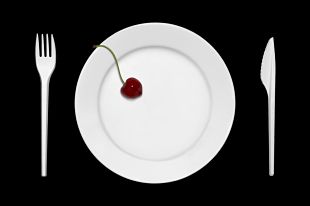
Selecting a diet is an important decision. It's worth the time to think it through and get some facts first.
And Why the Best Diet Is No Diet At All
Going on a diet is a serious decision. The eating plan you choose will impact your health, appearance, quality of life, self-image, and self-confidence. With so many diet choices, it’s easy to just go ahead with whatever is trendy or to follow the lead of co-workers, family, or friends.
You can lose weight on just about any combination of foods as long as you keep calories in check. But if you are undermining your health and metabolism in the process, you are making yourself into a time bomb for illness and future stubborn weight. Getting thinner will do you little good if your health and energy deteriorate.
With so much at stake, you can maximize your success by doing a little probing before making your choice. Here are the eight key questions that will guide you to the effective answer.
ONE. How fast will I lose weight? The answer you want to hear is “a pound or two a week.” This may sound slow to you compared to brash promises of some programs. Actually this rate of weight loss is sustainable and can be geared to fat loss (rather than the temporary water loss that is often a hallmark of rapid weight decreases). Plus cutting food intake drastically slows your metabolism, making it progressively more difficult to continue weight loss.
What’s more, given the polluted state of our planet, there is a certainty that you have highly toxic persistent organic pollutants (such as dioxins, DDT, flame retardants, and many more) dissolved in your body fat. When you lose fat too fast, these substances will flood your liver quickly, with a potentially profound effect on your health. This is because these pollutants are fat soluble, not water soluble. The liver is your organ to detoxify these dangerous chemicals and send them out of your body.
TWO. How much weight will I lose? BMI (Body Mass Index) is a measure of how your weight relates to your height The best answer is that you will lose enough weight to get to the ideal BMI of between 20 and 23. Research indicates that this BMI is the most protective against disease, and would be considered to be a trim weight without being skeletal.
Beware of diets that don’t give an answer, or hold up a set number of pounds or percent of your current weight. The amount you need to lose is based on your height and where you are starting.
THREE. How likely is it that I will regain the weight I’ve lost? Ask for success rates a year or two out, and you might just get an evasive response. However, if you lose weight just to regain it, you are likely to wind up in a worse place than you started. All weight loss results in the reduction of both fat cells and learn muscle mass. There is no way around this. A 2011 study published in the American Journal of Clinical Nutritionstudy shows that when you regain lost weight, the extra pounds come back mainly as fat,
with the lean muscle in scarce supply. So you definitely want to avoid the yo-yo diet effect.
FOUR. What foods will I eat? You might be primed to select a diet that emphasizes foods you already eat and like. However your tastes can change in three weeks with little stress, either physical or psychological. Given this fact, the oft-stated promise of being able to eat “the foods you love” on a diet becomes less persuasive.
Are you going to be eating animal products every day? These foods have been shown to increase the risk of heart disease, stroke, osteoporosis, some cancers, and other chronic illnesses. Or are you going to build your meals and snacks around whole plant foods – vegetables, fruits, beans, grains, nuts, seeds, herbs, and spices? These are the foods that thousands of research studies prove to enhance health and reduce the risk of chronic illness. Not to mention keeping your skin youthful.
FIVE. Will I be hungry on this diet? If the diet works through portion control, the answer is almost certainly “yes.” You may have been told that hunger is an inevitable part of dieting. However, portion control is a failed strategy for the vast majority of people.
Hunger is a basic survival instinct, similar to the need to breathe. You can deny it for only a relatively short amount of time. For some people this might be hours, for others it might be months. Either way, you are destined to eat until you are full sooner or later.
Your body has exquisitely sensitive sensors for both nutrients and calories, plus there are stretch receptors in your stomach telling you when it is full. You will lose weight permanently when you discover the eating plan that lets you satisfy all three sets of sensors at once. Such a food strategy will not leave you feeling hungry or deprived.
SIX. What is the effect of this diet on my health? Even if you care only about appearance, health should still be a major consideration. Why is this? You can’t look your best when you are low energy and plagued with chronic illness. You will not be vibrant and glowing when you are sick. And the pharmacy and doctors’ waiting rooms are not ideal places to meet a life partner or show off new clothes.
SEVEN. What peer-reviewed, published studies are there on this diet and what do they say?
There are surprisingly few studies on “name brand” diets. Weight Watchers has been the subject of more research than most. Published studies show a typical dieter on this eating plan, if the person starts out (for example) weighing 200 pounds, will weigh about 189 at the end of one year and about 193 at the end of two years. Is this the level of success you crave? In looking into this question, beware of studies funded by the company that stands to profit or studies that were never published in respected scientific
journals.
EIGHT. How much does this weight loss program cost? It’s reasonable to pay some money for information on how to attain and maintain a healthy weight. But the cost of prepared food and ongoing monthly fees can be a major budget hit.
The eating plan that gives the right answers to all eight questions is not a diet at all. Instead, it’s a decision to thrive on whole foods, plant-based food choices. This eating plan is based on vegetables, fruit, beans, potatoes, whole grains, nuts, seeds, herbs, and spices. This eating plan does not include animal foods or processed foods (including oil, margarine, soda, and other manufactured foods). It’s really a life choice, not a diet.
People who consistently follow this eating plan do generally lose a pound or two a week if they are overweight to start with. If you eat when you are hungry and stop when you are full, your eventual BMI should fall into the healthy range of 20 to 23.
As long as you continue this way of eating, the weight will stay off indefinitely and you will be eating nature’s finest foods. There is no need for arbitrary portion control and you will do best if you do eat until you are satisfied. Peer-reviewed published research shows a whole foods, plant-based diet can prevent and reverse chronic illness, including heart disease and diabetes. Dozens of studies show plant-eaters are, on average, leaner than those who eat animal foods.
Finally, a whole foods, plant-based diet can be quite affordable. Whole grains, beans, and potatoes are among the lowest-cost foods. The price of vegetables and fruit can be minimized through smart shopping. You might end up financially way ahead if you can work with your doctor to discontinue prescription drugs with expensive copays.
The next time you, a friend, or a family member is searching for a diet that works, use these questions as your guide. You will be spared disappointment and be rewarded with achievement.
If you enjoyed this post, you might want to read successes of formerly frustrated people who lost weight and gained health on a whole foods, plan-based diet. Here are stories of San’Dera Prude, Todd Rosenthal, Meridith Hayden, and Judi Menzel.
Intrigued? Now you can use our Whole Foods Blog Finder to target informative, fun postings on whole foods, plant-based nutrition. Quick information at no cost!
Blog posting by Janice Stanger, Ph.D. Janice authored The Perfect Formula Diet: How to Lose Weight and Get Healthy Now With Six Kinds of Whole Foods. This easy-to-follow eating plan is built on a whole foods, plant-based diet that can prevent, and even reverse, most chronic disease as well as get you to your perfect weight. Janice was overweight most of her adult life until finding this Perfect Formula Diet.
Tags: cardiovascular disease, diabetes, dieting, getting healthy, lose weight, Perfect Formula Diet, reverse chronic disease, weight loss, Weight Watchers, whole foods plant-based diet









Excellent article Janice! Those are great questions and definitely worth thinking over with any diet plan. I think a lot of us look at diet shopping like we’re shopping for the latest popular clothing brands and styles. Whatever looks great in the window or on tv is what we jump at. But with your questions we can get more for our value when it comes to the whole diet shopping thing and maybe even turn the diet into an enjoyable lifestyle that can be followed for our whole life.